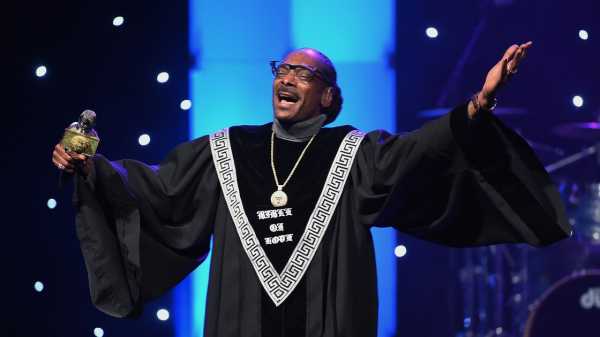
In Southern California, in the early nineteen-nineties, hip-hop was
mutating in heavy and thrilling ways. When the Long Beach rapper Snoop
Dogg, then known as Snoop Doggy Dogg, released “Doggystyle,” his
major-label début, in 1993, he was plainly positioned to become the next
great American m.c. He had just turned twenty-two. In 2013, on
the occasion of the record’s twentieth anniversary, he admitted to
Vibe, “No one
expected me to be good.” He came by his virtuosity honestly. “I was just
a young, dusty rapper,” he said. “I didn’t know how to talk in front of
cameras, I didn’t know how to articulate. I just was dope at making
music.”
Snoop was a key progenitor of G-funk, a subset of gangster rap that
leans heavily on funk samples, and features a slinking, almost
lackadaisical vocal. In 1992, he was a guest on “Deep
Cover,” Dr. Dre’s first
single after the dissolution of N.W.A. It’s hard to describe his
presence on the chorus: “Cause it’s one-eight-seven on the undercover cop,” he
pipes up, as if offering some irrefutable explanation. His delivery is
sing-songy and nearly furtive, which makes the lyric sound more like a
taunt than a threat. (Per California’s penal code, a one-eight-seven is a murder.)
Dr. Dre has a deep and abundant voice; when he raps, it’s like getting
artfully walloped with a large, blunt instrument. Snoop’s approach is
softer—steady, eternally unbothered—but no less menacing.
In the intervening decades, Snoop has built a multitudinous and
unprecedented career. He invented a lexicon, mostly by adding the suffix
–izzle to ordinary words, rendering them more delightful (“Is Dr.
Drizzay, so lizzay and plizzay / With D-O-double-Gizzay?” he asks on
“The Shiznit,” from “Doggystyle”), and indulged in flagrant, grinning
marijuana use long before weed was recognized (in some places) as
benign. In 2001, he wrote a pornographic film, “Snoop Dogg’s
Doggystyle,” which was directed by Larry Flynt. Though his early work
could be dark (in 1993, while recording “Doggystyle,” he was arrested in
connection with the death of Philip Woldemariam, a member of a rival
gang; he was defended by Johnnie Cochran, and later acquitted), Snoop
quickly revealed a joking, more impish side, as evidenced by the various
television programs (“Doggy Fizzle Televizzle,” “Dogg After Dark,” and,
most notably, “Snoop Dogg’s Father Hood”) he hosted or starred in
throughout the aughts. Without exception, he played the genial and
mischievous goof.
In 2005, he founded the Snoop Youth Football League, which is now the
largest youth football organization in Southern California. The idea was
to give disenfranchised or disadvantaged kids a path to something else:
“We went on a mission to try to stop the violence by going to the
roughest neighborhoods and grabbing these kids, coaches and ex-gang
members and throwing them in the fire and saying, ‘This is what we want
to do,’ ” he told
Billboard.
By 2010, Snoop was a mainstream mogul. He performed at the Kennedy
Center, honoring the jazz pianist Herbie Hancock; he appeared in an Old
Navy commercial; he
narrated “Planet
Earth”-style nature footage on “Jimmy Kimmel Live” (“Snakes are straight
assholes”); he even hosted a VH1
show with Martha Stewart, in which they chummily prepared healthful meals for
celebrity guests.
Yet he also kept making records, many of them groundbreaking. Earlier
this month, he released his sixteenth solo LP, “Bible of Love.” Though
Snoop was once affiliated with the Nation of Islam, and, in 2012,
announced his conversion to Rastafarianism (he briefly changed his name
to Snoop Lion, and released a reggae record, “Reincarnation”), “Bible of
Love” is a searching gospel album. It makes sense, on a narrative level,
that a man who has spent much of his life deviating and inventing would,
at forty-six, become interested in expressions of redemption and
forgiveness.
“Bible of Love” feels more like a début than anything else Snoop has
done. “Doggystyle” was his first album by chronological measures, but
Snoop was such an instinctive and studied rapper that he never sounded
green or shaky. What I like about “Bible of Love” is how flummoxed Snoop
appears. He produced the record with Lonny Bereal, and there are some
expert jams on it (particularly
“You,” featuring the
gospel singer Tye Tribbett, who has also worked with Justin Timberlake,
Usher, and Sting), but its wobblier moments are its most interesting. On
the seven-and-a-half-minute single “Words Are
Few,” which features a
guest vocal by the gospel singer B. Slade (who previously performed as
Tonex), Snoop mostly recuses himself to observe. The song begins with a
confession: “There are times when I don't wanna speak / Grab a pen,
scratch your chin, make a beat.” Though he’s not disavowing his previous
work, a kind of submission is implied; for a rapper to release a track
with a chorus that goes “When my words are few” is, itself, a kind of
prostration. By two minutes in, he’s offering only periodic
interjections. He is stepping aside, I think, to learn.
It’s possible gospel has never been this integrated
into mainstream hip-hop and pop before. Three of this decade’s most
high-profile hip-hop records (Chance the Rapper’s “Coloring Book,” Kanye
West’s “The Life of Pablo,” and Kendrick Lamar’s “Good Kid, m.A.A.d.
City”) all incorporate elements of contemporary black gospel; the
forty-seven-year-old gospel singer Kirk
Franklin has sold many millions of records, in an era in which selling
records is extraordinarily difficult. Yet “Bible of Love” doesn’t feel imitative or mercenary. Snoop is certainly a savvy performer and
businessman, but his trajectory has always felt honest, a product of his
time, place, and stature. That he is now looking for new ways to be
grateful feels both decent and real.
Sourse: newyorker.com






